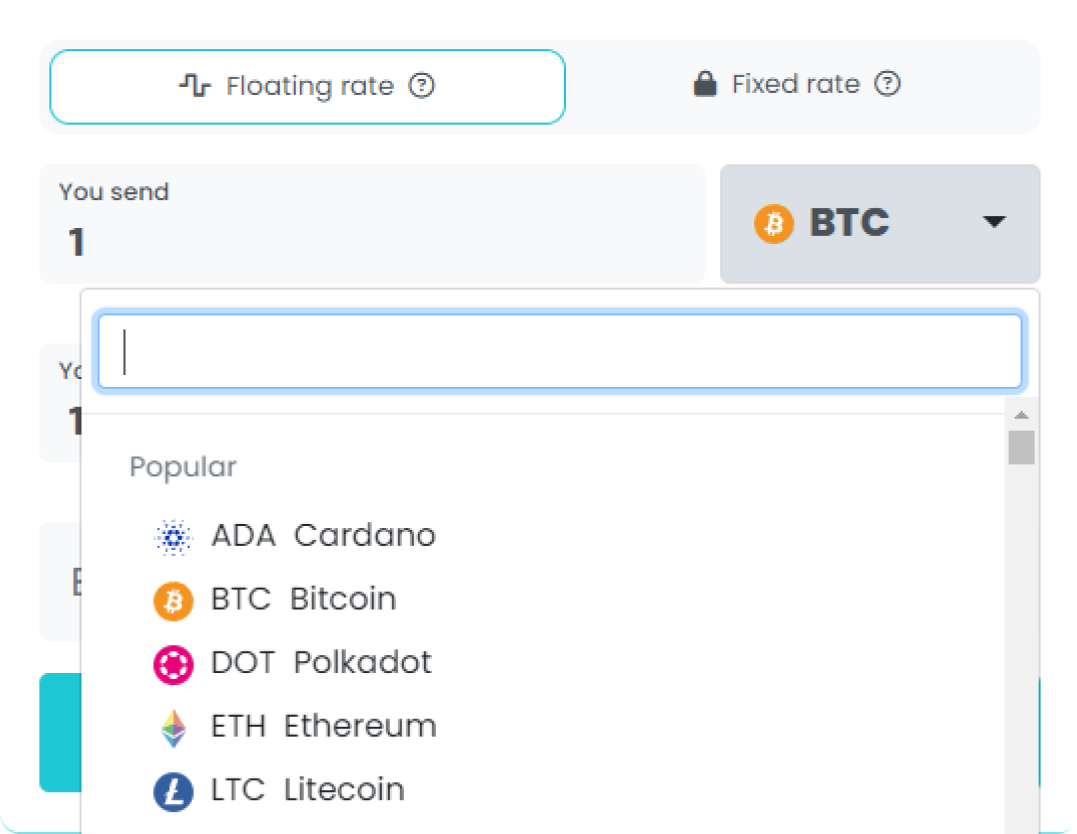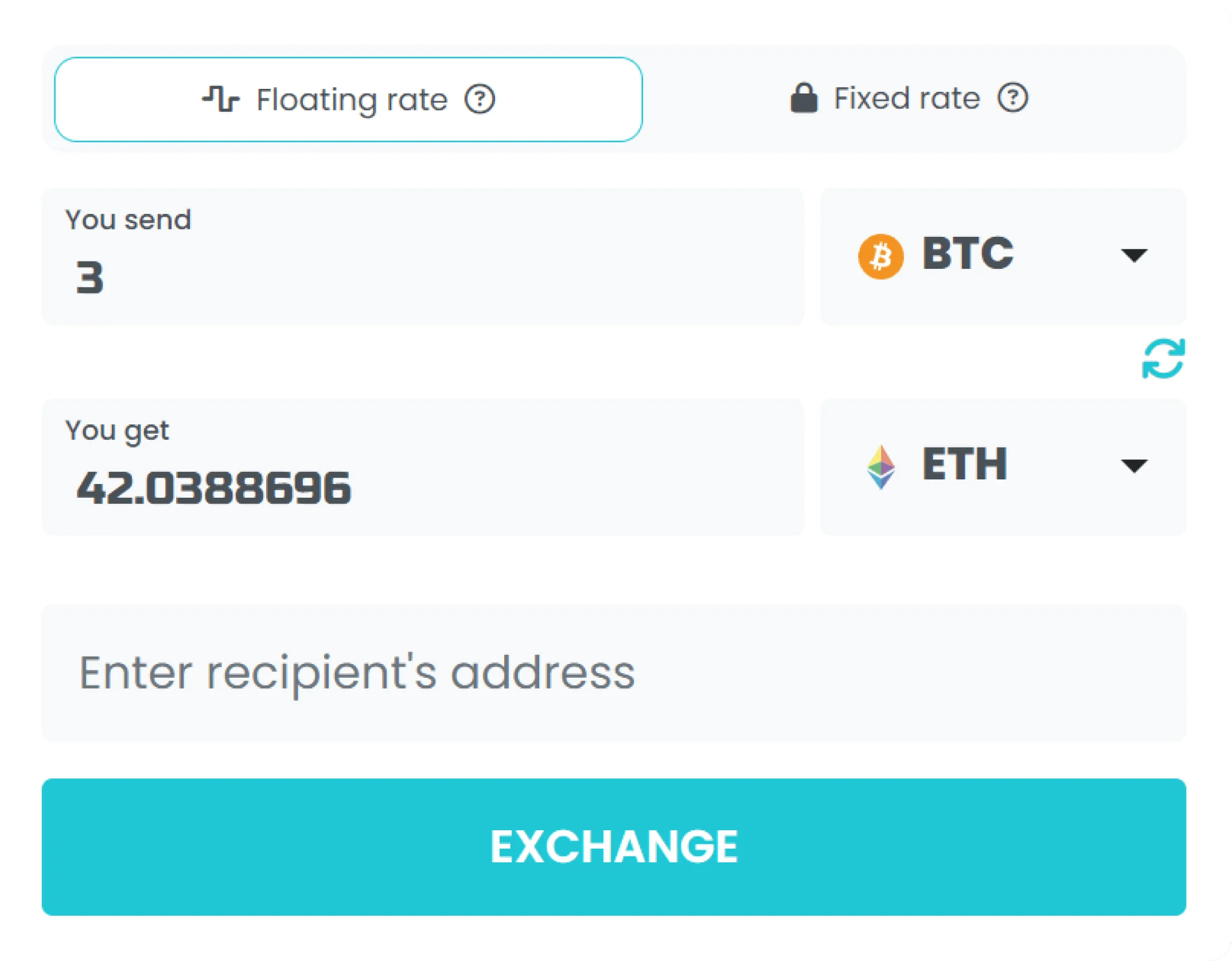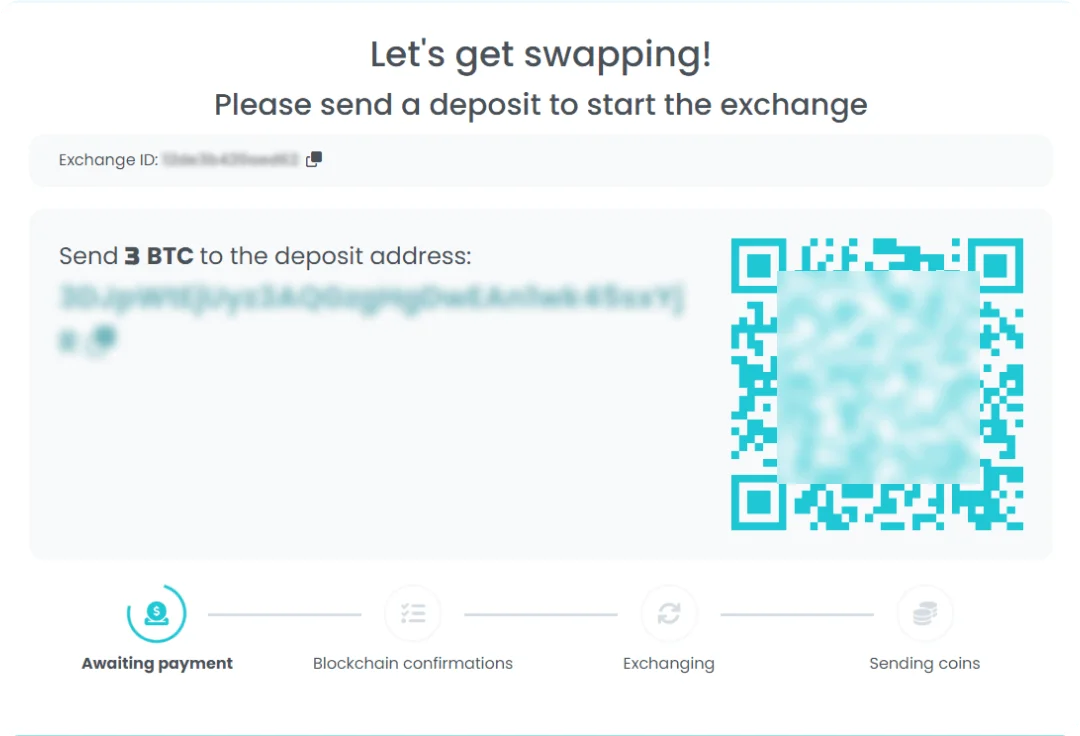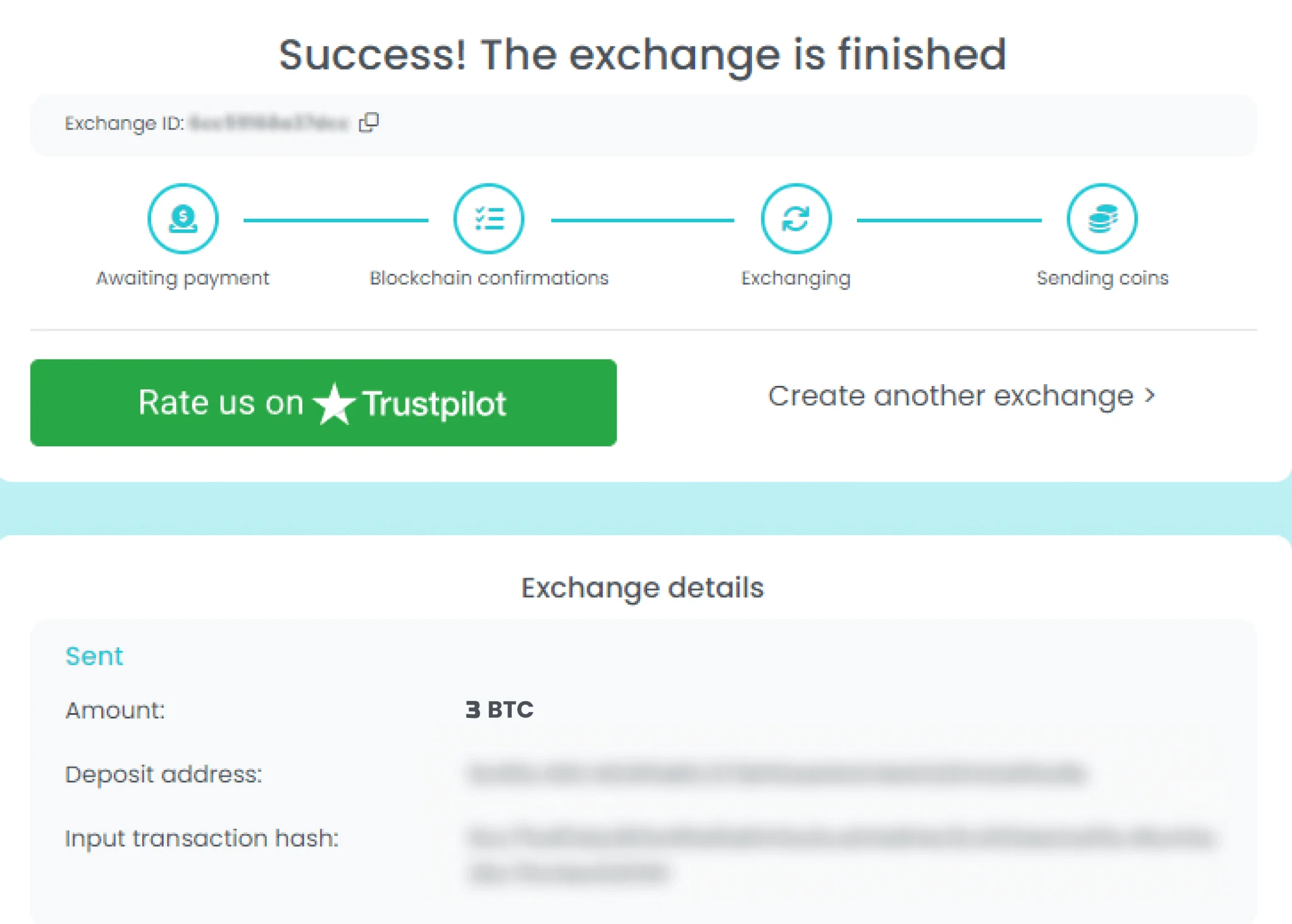How to Exchange Ethereum (ETH)
Exchange ETH instantly
Swap Ethereum (ETH) in a few clicks on Exchang.io.
Registration and limits free service.
Historical Price Chart
Ethereum Current Market Data
| Name | Ethereum |
|---|---|
| Price | $2,263.92 |
| Price Change 24h | -0.60% |
| Price Change 7d | -8.00% |
| Price Change 30d | -4.55% |
| Price Change 60d | 10.01% |
| Market Cap | $272,078,450,783.38 |
| Circulating Supply | 120,180,302.96 ETH |
| Volume 24h | $6,196,190,192.11 |
How to Exchange Ethereum in Just a Few Straightforward Steps
If you are looking to ETH exchange, you are in the right place. Swap Ethereum in a matter of minutes using Exchang.io crypto exchange. Just adhere to these 4 simple steps.




Benefits of Exchanging ETH on Exchang.io

Simple
We make sure not to overload our website with unnecessary elements. Only the things you need for smooth Ethereum conversions.Simple and clear.

Secure
Exchang.io is a safest place to exchange ETH. Get ETH anonymously, without KYC and registration.
In touch
Write to us in any unclear situation with ETH swaps. Our support team is happy to help you 24/7.
Fast
We are constantly upgrading our platform to make Ethereum exchanges really fast. The average speed for the swap is about 5-15 minutes.Popular Ethereum trading pairs
Here are some popular ETH trading pairs. You can buy ETH with every listed coin on Exchang.io.
How Much Ethereum Can I Exchange on Exchang.io?
Exchanging Ethereum on Exchang.io is unlimited. You can start swapping ETH right now starting from the lower limit of ≈ $3.
There are no upper limits for Ethereum exchanges at Exchang.io. Exchange Ethereum with other cryptocurrencies from the list of over 700 coins as much as you want to.
Cross-chain exchanges are available; just choose any coin on any network and click the Exchange button, and we'll do the rest for you
Why exchange Ethereum?
Things you will be able to do with exchanged ETH:
With Ethereum, you can participate in decentralized finance (DeFi) by providing liquidity to lending and borrowing platforms or staking your ETH for passive income. Additionally, you can engage in yield farming, where you earn additional tokens by locking up your ETH in various protocols. Furthermore, Ethereum allows you to buy goods and services from merchants who accept ETH as a form of payment. Finally, you can trade your Ethereum on cryptocurrency exchanges to take advantage of price movements and potentially generate profits. To engage in these activities, you will need an Ethereum wallet to securely store and manage your cryptocurrency.
What is Ethereum?
Ethereum is a decentralized blockchain platform that enables the creation and execution of smart contracts. It was proposed by Vitalik Buterin in late 2013 and introduced to the public in 2015. Unlike Bitcoin, which primarily serves as digital money, Ethereum offers a more versatile platform for building decentralized applications (DApps) and executing complex programmable transactions.
The native cryptocurrency of the Ethereum network is called Ether (ETH). While Bitcoin aims to be a digital currency alternative to traditional fiat currencies, Ethereum's primary goal is to provide a decentralized platform for developers to build and deploy smart contracts and DApps. Ether is used as "fuel" for executing these smart contracts and facilitating transactions within the Ethereum network.
One key difference between Ethereum and other cryptocurrencies is its ability to support smart contracts. Smart contracts are self-executing agreements with predefined rules and conditions written into their code. They automatically execute once the conditions are met, providing a trustless and transparent way to facilitate various types of transactions, such as buying or selling tokens, transferring ownership, or participating in decentralized finance (DeFi) protocols.
Another significant distinction is Ethereum's focus on fostering innovation through its robust developer community and ecosystem. The Ethereum network has become a hub for creating new projects, including decentralized applications, tokens, and decentralized finance platforms. This vibrant ecosystem has led to the emergence of numerous projects and tokens built on top of Ethereum, contributing to its growth and adoption.
Additionally, Ethereum differentiates itself through its use of the Solidity programming language, specifically designed for writing smart contracts, and its compatibility with the ERC-20 token standard. The ERC-20 standard provides a common set of rules and interfaces that enable the creation and interaction of fungible tokens on the Ethereum blockchain. This standardization has facilitated the widespread adoption and interoperability of tokens issued on the Ethereum network.
In terms of exchanges, Ethereum enjoys broad support and can be traded on numerous cryptocurrency exchanges worldwide. Its liquidity and market capitalization make it one of the most widely available and recognized cryptocurrencies in the industry. The price of Ethereum, like other cryptocurrencies, is determined by market supply and demand dynamics and can fluctuate significantly.
To engage with Ethereum, users typically need a cryptocurrency wallet that supports Ether. These wallets allow users to store, send, and receive ETH securely. They come in various forms, including software wallets (e.g., MetaMask), hardware wallets (e.g., Ledger), and web-based wallets (e.g., MyEtherWallet).
In summary, Ethereum stands out from other cryptocurrencies due to its focus on smart contract functionality, its vibrant developer community, and extensive ecosystem. It provides a platform for decentralized applications and programmable transactions through the use of its native cryptocurrency, Ether. Ethereum's ability to execute smart contracts and foster innovation has contributed to its widespread adoption and prominence within the blockchain industry.
Brief History of Ethereum
Ethereum (ETH) is a popular cryptocurrency that was created by Vitalik Buterin in 2015. It was designed as an open-source platform to enable the development and execution of decentralized applications (DApps) and smart contracts. Ethereum introduced a groundbreaking concept known as the Ethereum Virtual Machine (EVM), which allows developers to build and deploy applications on its blockchain.
The Ethereum network operates through a decentralized peer-to-peer system, making it resistant to censorship and control. ETH serves as the native currency of this platform and is used for various purposes, including incentivizing miners to validate transactions and executing smart contracts. The coin has gained significant recognition and value in the cryptocurrency market.
One of the key features of Ethereum is its ability to create and execute smart contracts. These are self-executing agreements that automatically execute when certain predefined conditions are met. Smart contracts have numerous real-world applications, such as facilitating secure and transparent transactions, creating decentralized applications, and enabling the tokenization of assets.
Ethereum has also become a popular choice for Initial Coin Offerings (ICOs), allowing startups and projects to raise funds by issuing their own tokens on the Ethereum blockchain. This has contributed to the widespread adoption and usage of ETH within the cryptocurrency ecosystem.
To facilitate the trading of ETH and other cryptocurrencies, numerous exchanges have emerged. These platforms provide a marketplace where individuals can buy, sell, and trade digital assets. Some well-known exchanges that support Ethereum include Binance, Coinbase, and Kraken.
The price of Ethereum has experienced significant volatility since its inception. Like other cryptocurrencies, its value is influenced by various factors such as market demand, investor sentiment, regulatory developments, and technological advancements. The price of ETH can fluctuate rapidly, presenting both opportunities and risks for traders and investors.
For users to store and manage their Ethereum holdings securely, they can utilize cryptocurrency wallets. These wallets come in different forms, including hardware wallets, software wallets, and online wallets. They provide a means to store private keys, which are necessary for accessing and managing one's cryptocurrency assets.
In recent years, Ethereum has undergone several upgrades to improve scalability and address limitations. Notably, the network is transitioning from a proof-of-work (PoW) consensus mechanism to a proof-of-stake (PoS) model. This upgrade, known as Ethereum 2.0 or ETH2, aims to enhance transaction throughput, reduce energy consumption, and make the network more sustainable.
Ethereum has played a pivotal role in the development of blockchain technology and has inspired the creation of numerous other cryptocurrencies and blockchain projects. Its versatility and robustness have made it one of the best-known and widely used cryptocurrencies in the market.
In conclusion, Ethereum (ETH) is a groundbreaking cryptocurrency that introduced the concept of smart contracts and decentralized applications. It has gained widespread recognition and value since its inception, attracting developers, investors, and users alike. With its vibrant ecosystem, numerous exchanges supporting ETH, and the continuous development of the Ethereum network, it remains at the forefront of innovation in the cryptocurrency space. The value of ETH can be volatile, but its potential for creating new applications and transforming industries continues to drive its adoption and usage.
Ethereum Key Advantages and Unique Features
Ethereum, the second-largest cryptocurrency by market capitalization, offers several key advantages and unique features that have contributed to its widespread adoption and success in the digital currency space.
One of the standout features of Ethereum is its smart contract functionality. Smart contracts are self-executing agreements coded on the Ethereum blockchain, allowing for the automation and verification of complex transactions without the need for intermediaries. These contracts enable a wide range of applications to be built on top of the Ethereum platform, from decentralized finance (DeFi) protocols to non-fungible tokens (NFTs) and decentralized applications (dApps). Ethereum's robust smart contract capabilities have revolutionized industries and opened up new possibilities for developers and businesses alike.
Another significant advantage of Ethereum is its large and active developer community. Ethereum has established itself as a vibrant ecosystem with an extensive network of developers constantly working on improving the platform. This active community ensures continuous innovation, rapid development, and regular upgrades through Ethereum Improvement Proposals (EIPs). The constant evolution and improvement of the Ethereum network make it a dynamic and future-proof platform for building decentralized applications and services.
Ethereum's scalability solutions have also been a focus of development efforts. While the Ethereum network initially faced challenges with congestion and high fees during periods of heightened demand, several scaling solutions, such as layer 2 solutions like Optimistic Rollups and zk-rollups, have been implemented or are in the works. These solutions aim to increase the transaction throughput and reduce fees, making Ethereum more scalable and efficient. These advancements address concerns around network congestion and offer improved usability for users and developers.
Interoperability is yet another advantage of Ethereum. The Ethereum Virtual Machine (EVM), the runtime environment for executing smart contracts on Ethereum, has become a standard in the blockchain industry. This compatibility allows developers to build applications using a wide range of programming languages and frameworks, fostering interoperability between different blockchains and platforms. Additionally, Ethereum's ERC-20 token standard has become the foundation for countless tokens and has greatly facilitated the creation and exchange of digital assets on various exchanges.
Lastly, Ethereum's decentralized governance model sets it apart from many other cryptocurrencies. Decisions regarding protocol upgrades, improvements, and community initiatives are made through a consensus-driven process involving stakeholders and Ethereum token holders. This decentralized governance structure ensures transparency, inclusivity, and community-driven decision-making, reducing the influence of centralized entities and promoting a more democratic approach to managing the ecosystem.
In conclusion, Ethereum offers key advantages and unique features that contribute to its prominence in the cryptocurrency landscape. Its smart contract functionality enables the automation and verification of complex transactions, while its active developer community drives continuous innovation. Scalability solutions address concerns around congestion and high fees, and interoperability fosters compatibility with other blockchains. Furthermore, Ethereum's decentralized governance model promotes transparency and community participation. As a result, Ethereum has become a trusted platform for a wide range of applications, and its native cryptocurrency, Ether (ETH), plays a pivotal role in powering the network and facilitating transactions within the ecosystem. Whether you want to build decentralized applications, buy or exchange Ether, or participate in the Ethereum ecosystem, it is an influential and versatile cryptocurrency worth considering.
10 Facts About Ethereum
Ethereum is a decentralized cryptocurrency platform that was introduced by Vitalik Buterin in 2015.
Ethereum, often abbreviated as ETH, operates on a blockchain technology similar to Bitcoin but with additional functionality.
One of the key features of Ethereum is its ability to support smart contracts, which are self-executing contracts with predefined conditions.
Ethereum has gained significant popularity and is currently the second-largest cryptocurrency by market capitalization after Bitcoin.
The Ethereum blockchain enables developers to build decentralized applications (DApps) and create their own tokens through the use of smart contracts.
Ethereum has its native currency called Ether (ETH), which is used to facilitate transactions and pay for computations on the network.
The price of Ethereum has experienced significant volatility since its inception, making it an attractive investment option for traders.
Many cryptocurrency exchanges offer Ethereum trading pairs, allowing users to buy and sell ETH using various other cryptocurrencies or fiat currencies.
Storing Ethereum and other ERC-20 tokens requires a digital wallet, which provides a secure and convenient way to manage your assets.
With its robust ecosystem, Ethereum has become one of the best platforms for decentralized finance (DeFi) applications, offering various financial services such as lending, borrowing, and decentralized exchanges.
What is the Best Place to Exchange ETH?
Via Exchang.io service you can effortlessly swap Ethereum for over 700+ different assets. Begin by selecting ETH and your desired coin, paying attention to the network when making your choice. Next, provide the recipient's wallet address for the coin you're swapping to, and press 'Exchange' to continue. Deposit the required amount of ETH to the address displayed on the screen, ensuring you have the necessary amount to finalize the transaction. Once completed, check your wallet to confirm the arrival of your newly acquired coin. Exchang.io makes exchanging Ethereum simple and convenient, allowing you to enjoy a seamless experience with an extensive selection of coins to choose from.
Do I need to create an account on Exchang.io to swap Ethereum?
No, you don't need to create an account or provide personal information on Exchang.io. It's a registration-free service without ID verification requirements. Simply follow the straightforward steps and buy Ethereum with your crypto.
How long does it take to exchange Ethereum on Exchang.io?
The exchange process on Exchang.io is usually very fast, taking only a few minutes to complete. The actual time may vary slightly depending on network traffic and transaction confirmation times.
What is the minimum amount needed to swap ETH on Exchang.io?
There is a minimum amount required for Ethereum exchange on Exchang.io. However, please note that this minimum amount is subject to change. Therefore, it's recommended to check the platform for the latest requirements.
Is Exchang.io legit? Why should I trust Exchang.io?
Exchang.io is a trustworthy platform with a team of experienced crypto enthusiasts who have been in the industry for over 7 years. Their main goal is to provide a convenient, fast, and transparent user experience. To ensure continuous improvement, they actively seek feedback from the community through social networks. You can also check reviews on Exchang.io.com to gain further confidence.
What are some popular Ethereum trading pairs?
Popular Ethereum trading pairs on Exchang.io include ETH/BTC, ETH/ETH, ETH/LTC, and ETH/USDT, among others.
Are cross-chain exchanges available for Ethereum?
Yes, Exchang.io supports cross-chain exchanges for Ethereum. You can choose any coin on any network, click the 'Exchange' button, and Exchang.io will handle the rest.
